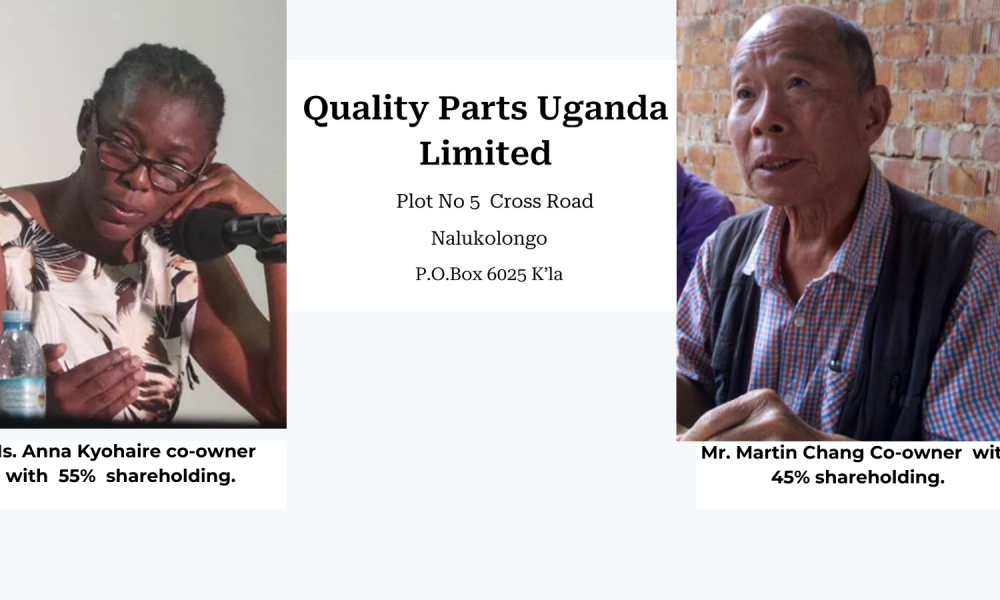MEDIA FOR CHANGE NETWORK
The Taiwanese investor & Others: Dozens of community land and environmental rights defenders are in prison for opposing his aggressive land acquisition tactics.
Published
10 months agoon
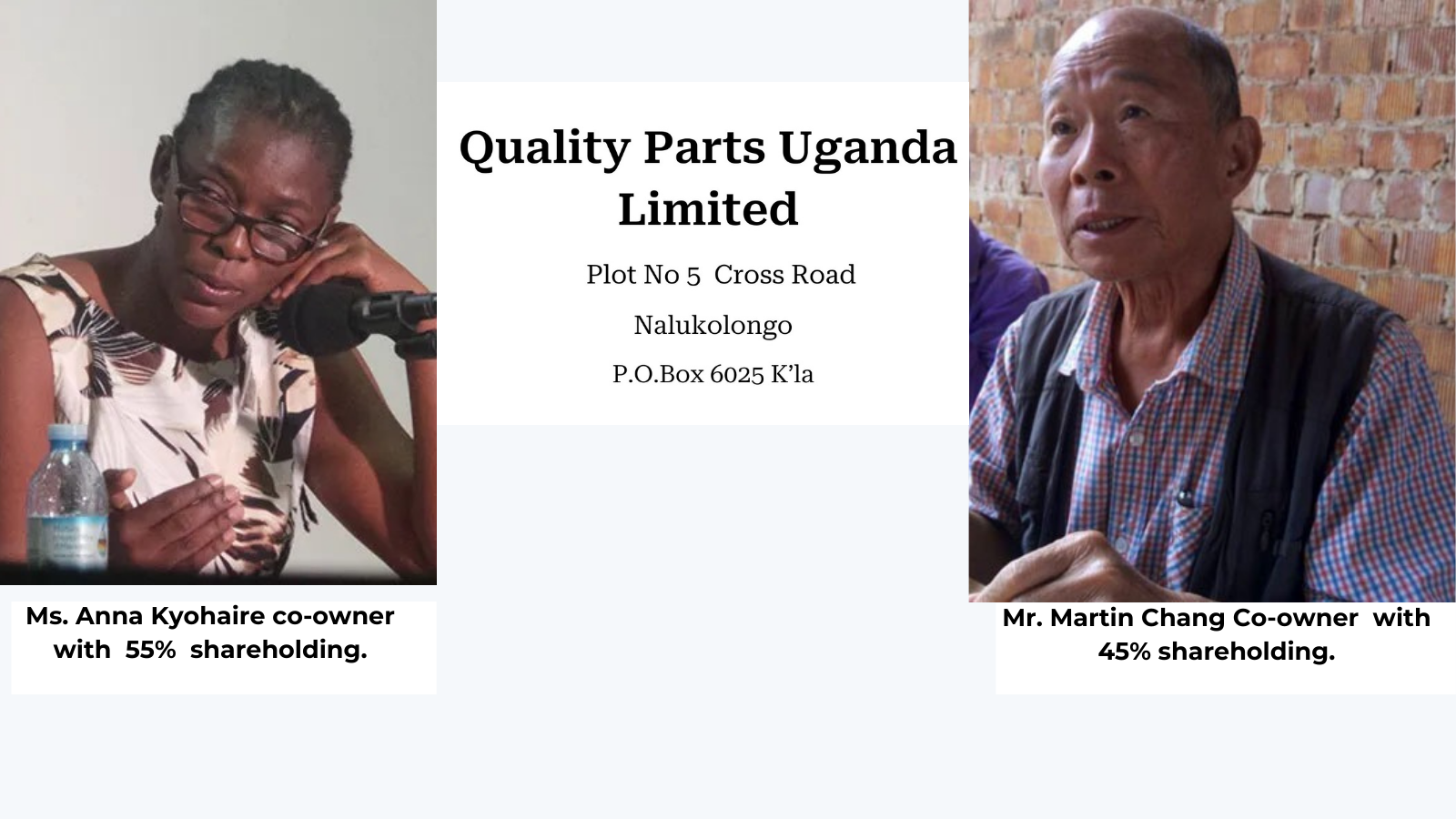
By Witness Radio team.
An independent investigation by Witness Radio has revealed that a tree plantation co-owned by the Taiwanese has aided the criminalization of over 20 community land defenders’ work in Mubende District and caused prison sentences ranging from 30 months to 34 years, respectively.
Witness Radio is a Ugandan-based not-for-profit organization that uses legal aid support and media-oriented approaches, such as investigative, data, and advocacy journalism, to protect and promote the land and environmental rights of local and Indigenous communities in development.
These investigations, spanning two months, have unearthed a staggering 23 cases of criminalization against defenders since Quality Parts commenced operations in Mubende District in 2011. These arbitrary arrests, kidnaps, raids of defenders’ homes at night, assaults, tortures, and alleged aiding of unfair convictions are a stark reminder of the profound injustice faced by those who oppose the company’s land grab of the community land.
For many years, Quality Parts Limited has deployed Mubende district police, private security firms, and company workers to carry out intimidation, coercion, and manipulation. No community member has ever been consulted or consented to the removal of their land.
In their unwavering commitment, these defenders are protecting a community of smallholder farmers who have lawfully occupied and cultivated their land for over five (5) decades. Most smallholder farmers have legal documents proving their legitimate land ownership, starkly contrasting the injustice they face.
Quality Parts Uganda Limited, incorporated in 2000, operates plantations of pine and eucalyptus trees in Mubende district, southwestern Uganda. The company is co-owned by Taiwanese investor Chang Shu-mu, known as Martin Chang, and his wife, Anna Kyoheirwe.
When writing this report, nine (9) community defenders are serving prison sentences ranging from 30 months to 34 years in Muyinayina and Kaweeri government prisons in the Mubende district, with the majority facing multiple offenses. According to Witness Radio interviews, more community defenders allege that the company regularly threatens community land defenders that they will face the same fate if they continue to oppose its actions.
In the latest incident, hell broke loose in the early morning hours of January 29, 2024, when four Quality Parts Uganda Ltd company workers, guarded by three armed police officers in casual attire (later it was established to be attached to Mubende Central Police Station), attacked, beat, and arbitrarily arrested three land rights defenders based in Kicuculo village, Kiruuma Sub-county in Mubende district accusing them of destroying the tree plantation. It was the second brutal arrest of the trio.
The three defenders, Byakatonda David, Kabuuka Levi, and Byamukama Yuda, the Kicucuulo Village chairman, were briefly taken to Mubende Police before being aligned before Mubende district Magistrates’ Court. They were charged with malicious property damage and remanded to Kaweeri Prison on the same day.
Mr. Byamukama Yuda is one of those serving a 30-month sentence at Muyinayina Prison; an interview with Witness Radio revealed that three armed Police officers from Mubende and company officials raided his home at 5 a.m., manhandled and assaulted, and arrested him without explanation.
“In the early hours of the morning, the group raided my home and ordered me to open the door. At first, I hesitated because I had no idea who they were since they never introduced themselves. But when they started aggressively banging one of my house’s doors, my wife and I had no choice but to open it. The moment I did, my eyes met the furious faces of armed officers who humiliated and assaulted me in front of my wife and children before forcefully arresting me without offering any explanation. These officers threw me into a waiting saloon car whose number plates I can’t recall, where I found workers from Quality Parts. Instead of offering any clarity about my arrest, they just threatened me, accusing me of being ‘big-headed. Within minutes, they sped off to my son Levi’s home, where he, too, was arbitrarily arrested alongside me,” Byamukama revealed.
Another defender, 62-year-old Byakatonda David, was forcefully arrested by masked gangs wielding machetes, led by a man named Kayumba, affiliated with Quality Parts Uganda Ltd. He revealed, “These men told me that the police had instructed them to arrest me and take me to join the other two who had been arrested earlier (Byamukama and Kabuuka). They forcefully arrested threatening to cause more harm to me in case I tried to resist,” the defender told Witness Radio.
They further revealed that their continued mobilization of community members (villagers) to resist the company’s land grab continues to lead to their criminalization. This continued criminalization highlights the deep-rooted injustices that defenders face when opposing harmful development projects. The trio spent five months on remand at Kaweeri prison, appeared in court over 18 times, and emphasized that their conviction was made in bad faith.
“First of all, this case was unnecessarily delayed, as either the state or the magistrate frequently absented themselves, forcing us to appear in court numerous times. The trial was also unfair, as we were never allowed to defend ourselves. Also, the evidence presented was fake. In the ruling, the magistrate stated that the testimony of four witnesses satisfied the court, yet only three appeared, and even their evidence was questionable,” Mr. Byakatonda further mentioned.
Witness Radio has also established that powerful multinational companies are using police, district officials, and court personnel to aid land grabbing. The same system weakens the poor landowners and forces them to surrender their land for Quality Parts. “When we try to resist, they oppress us. The company tells us they are backed by government officials and other powerful individuals in security forces, which is evident because even when we report our cases to authorities, little or no action is taken. They tell us we have no power to oppose the investors,” Byamukama expressed his disappointment.
On June 21, 2024, the three were convicted of malicious damage to property and sentenced to 30 months in Muyinayina prison despite inconsistencies in the evidence presented by witnesses.
The charges against the community defenders stem from a violent incident on December 6, 2022, when a group of over 20 casual workers linked to Quality Parts Uganda Ltd attacked the village of Kicucuulo, hacked people, and destroyed property, including houses and crops. These workers raided the homes of outspoken community members, cut people with pangas, and beat everyone they found in their homes, threatening to kill them if they didn’t leave the land. Three people were hacked, while properties worth millions of Shillings were destroyed.
Despite the violence they endured that day, those who were hacked and others whose property was destroyed were arrested when they went to report the incident to Mubende police.
Meanwhile, the company workers responsible for the harm remained untouched. At that time, the defenders, Kabuka Levi, Lubwama Robert, Bulegeya Erisa, Byakatonda David, and Byamukama Yuda, were arrested, interrogated, and made to record statements before being released on police bond.
“When we reached Mubende police, we were all arrested and interrogated for almost an hour before recording statements on malicious damage charges. The company claimed we cut its trees, which we did not do,” Mr. Kabuka Levi told Witness Radio in an interview in 2023.
Witness Radio’s investigations have also found out that by the time the alleged tree cutting took place, as said by the company and its witnesses in court, that is the same time, the accused were treating wounds from the previous attack by the company workers, raising questions on whether the accused were the real suspects.
“It is unfortunate that people accused of committing land-related crimes against the ‘investor’ are landowners who have for generations occupied and cultivated their land until they faced this violent land grab. Duty bearer agencies have been captured and are being used to target defenders and activists pushing back forced evictions,” Witness Radio’s Team Leader Jeff Wokulira Ssebaggala said.
The Mubende Magistrates Court eventually dismissed the case on October 17, 2023, due to a lack of evidence. However, in January 2024, the three Byamukama, Byakatonda, and Kabuuka were arrested, charged, and convicted again for the same offense of cutting the company’s trees.
This trend of persecution has instilled fear in the majority of the community, with a saying: “You accept what the company wants, or you go to jail for opposing it.” Other individuals arrested for resisting the company’s land grab include Kaberuka Fenehansi, who died last year while serving a prison sentence; Sinamenya Paul, Ssemombwe Richard, Ategeka Esau, Bukenya Godfrey, Ssebanenya Yona, and Sserugo Sam, all serving sentences ranging from 15 to 34 years.
Related posts:
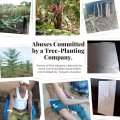
 Court charges and remands two community land rights defenders and eight farmers to prison
Court charges and remands two community land rights defenders and eight farmers to prison
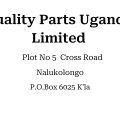 Details Revealed: Who’s a Taiwanese Investor linked to forcefully taking over 2500 hectares of land that belonged to local farmers in the Mubende district for a tree plantation project?
Details Revealed: Who’s a Taiwanese Investor linked to forcefully taking over 2500 hectares of land that belonged to local farmers in the Mubende district for a tree plantation project?
 Uganda: Targeting community land and environmental defenders with criminal offenses is rising as two community land rights defenders arrested in a hotspot district of forced land evictions.
Uganda: Targeting community land and environmental defenders with criminal offenses is rising as two community land rights defenders arrested in a hotspot district of forced land evictions.
 Uganda: the number of community environmental and land rights defenders targeted for challenging irresponsible business practices has reached more than 1500 victims as of June 31st, 2023.
Uganda: the number of community environmental and land rights defenders targeted for challenging irresponsible business practices has reached more than 1500 victims as of June 31st, 2023.

You may like
MEDIA FOR CHANGE NETWORK
Activists storm TotalEnergies’ office ahead of G20 Summit, demand end to fossil fuel expansion in Africa
Published
3 days agoon
November 21, 2025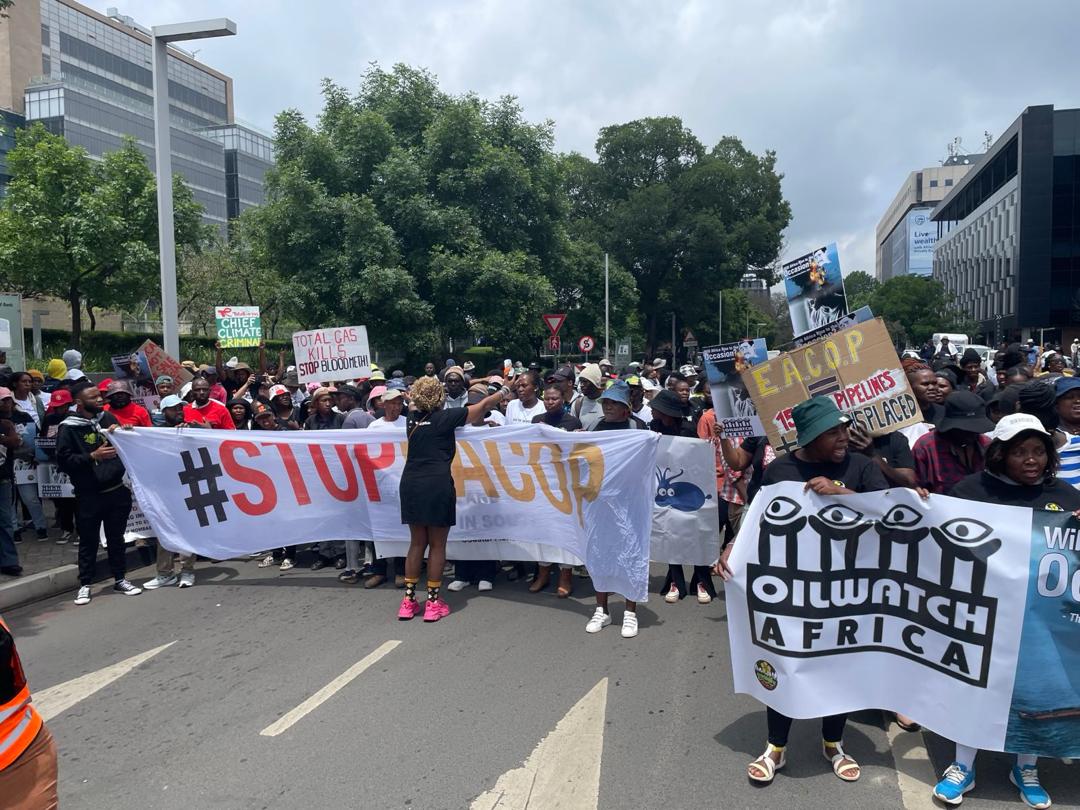
By Witness Radio team.
South Africa – As South Africa prepares to host the G20 Leaders’ Summit on the 22nd and 23rd, another gathering has already made its voice heard. Activists, including climate activist groups and affected communities, stormed the Johannesburg offices of TotalEnergies on Thursday to express their disappointment over the company’s continued investments in fossil fuels, which they say have resulted in gross human rights violations.
The action, they said, is part of a broader fight to “End a Century of Exploitation, Greenwashing, and Fossil Fuel Expansion in Africa.”
A coalition of 29 organizations marched to the company’s offices in Johannesburg, delivering a petition alongside banners reading “Africa Is Not for Sale,” “Stop EACOP,” and “100,000 Displaced.” They called on the France-based corporation to halt all new oil and gas exploration and development in Africa, including the East African Crude Oil Pipeline (EACOP), the Mozambique gas project, and offshore drilling in South Africa.
They also demanded that TotalEnergies acknowledge and compensate communities whose land, livelihoods, and ecosystems have been harmed by its operations.
The demonstration was organised by Fossil Ad Ban, StopEACOP, Green Connection, Earthlife Africa, Power Shift Africa, and others. It coincides with the G20 Leaders’ Summit, which begins in Johannesburg on Saturday, the 22nd of November, 2025.
“We are marching shortly before the G20 Summit to draw world leaders’ attention to our calls,” said Lazola Kati, the campaign coordinator for Fossil Ad Ban.
The G20, composed of 20 countries, the European Union (EU), and the African Union (AU), addresses global economic issues, including climate change mitigation, international financial stability, and sustainable development. This year marks the first G20 Summit to be held on African soil, under the theme “solidarity, equality and sustainability.”
Activists say the Summit offers a critical moment to expose injustices committed by Global North countries and corporations that claim to promote development in the Global South, while instead profiting from these projects that leave affected communities in misery.
Their central message targets TotalEnergies. Activists accuse the company, now marking 101 years of existence, of causing environmental destruction, land dispossession, and human rights violations across the continent.
“From the Niger Delta to Cabo Delgado, from EACOP’s route through Uganda and Tanzania to the expanding offshore oil blocks along South Africa’s coast, TotalEnergies has built profit on the suffering of people and the degradation of ecosystems,” reads part of the coalition’s letter addressed to TotalEnergies South Africa.
They argue that while the company brands itself as a “green” and “responsible” energy leader, it continues to pour billions of dollars into new oil and gas projects, while spending millions on advertising and sponsorships to present itself as climate-friendly, an act they describe as corporate greenwashing that obstructs real climate action.
Patrick Edema of StopEACOP noted that the pipeline will pass through 178 villages in Uganda and 231 in Tanzania, causing massive physical and economic displacement. “Our message is clear: TotalEnergies’ century of harm ends now. We will not allow you to mortgage our future for your fossil fuel profits. We will #StopEACOP,” he said.
An estimated 100,000 people in Uganda and Tanzania have already lost, or will lose, land used for farming or livestock due to the project.
In Mozambique, TotalEnergies’ fossil gas project in Cabo Delgado has also caused widespread displacement. The company and its partners are constructing a gas processing plant on a 7,000-hectare site allocated by the government, a move that required the relocation of 557 households, many of whom say promised compensation and replacement land never materialised.
“Africa does not need another century of fossil fuel colonialism,” the coalition stated in its letter. “We need a future powered by justice, renewable energy, and community-led solutions.” They called on TotalEnergies to align with the demands expected to be raised at the G20 and COP30 conferences: to end fossil fuel subsidies and to stop all new oil and gas development.
Lisa Makaula, advocacy officer at The Green Connection, emphasized the urgency for communities to speak out. “The world is at a tipping point, and as developing nations, we cannot afford to invest in fossil fuel projects that will worsen the impacts of climate change. Fisher livelihoods are already being destroyed in West Africa due to oil and gas exploration. We need committed leaders who will ensure that oceans are protected and that communities are not left behind as we transition to a low-carbon economy, with equity and fairness at the forefront.”
In their letter, the coalition further demands that TotalEnergies commit to a just and equitable transition that prioritizes renewable energy, distributive justice, and African ownership of the energy transition.
Related posts:
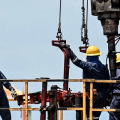
 Banks have given almost $7tn to fossil fuel firms since Paris deal, report reveals
Banks have given almost $7tn to fossil fuel firms since Paris deal, report reveals
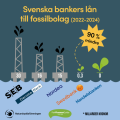 New billion-dollar loans to fossil fuel companies from SEB, Nordea and Danske Bank.
New billion-dollar loans to fossil fuel companies from SEB, Nordea and Danske Bank.
 Financial Institutions from Africa have made a monumental commitment of $100 billion to Africa’s green industrialization, a decision of immense significance that has the potential to shape Africa’s future.
Financial Institutions from Africa have made a monumental commitment of $100 billion to Africa’s green industrialization, a decision of immense significance that has the potential to shape Africa’s future.
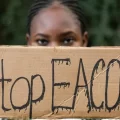 Well connected: The resistance against the fossil industry in East Africa.
Well connected: The resistance against the fossil industry in East Africa.
MEDIA FOR CHANGE NETWORK
Environmentalists reject TFFF, warning it will deepen forest destruction.
Published
4 days agoon
November 20, 2025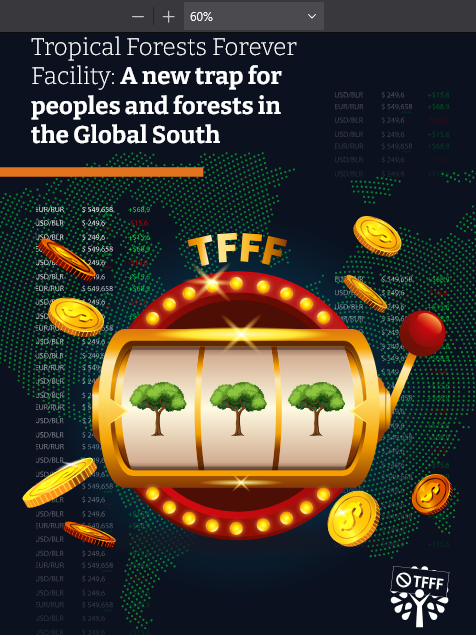
By Witness Radio team
The Tropical Forest Forever Facility (TFFF), unveiled with great fanfare on November 6th, 2025, as a pre-event ahead of the 30th UN Climate Conference in Belém, is already facing a storm of criticism from civil society and environmentalists.
More than 200 civil society organizations, Indigenous networks, and environmental justice groups from every corner of the globe are demanding an immediate halt to the initiative, calling it “a false solution that will deepen forest destruction rather than stop it.”
The Tropical Forest Forever Facility (TFFF) is a proposed global financing mechanism intended to support the long-term protection of tropical forests. Its goal, according to those behind it, is to offer stable, ongoing funding to countries that preserve or expand their forest cover, using investment-generated returns to reward practical conservation efforts.
But activists warn that the facility is being promoted as a bold new funding model for forest conservation. Yet, in reality, it is built on a financial structure that they say will benefit wealthy investors while burdening tropical forest nations with more debt, potentially leading to their further exploitation.
While in Belém, Brazil, on November 6th, global leaders officially launched the Tropical Forest Forever Facility (TFFF), with a collective investment of USD $5.5 billion following an initial US$1 billion committed by Brazil in September this year.
COP30 is the United Nations Climate Change Conference taking place in Belém, Brazil, from November 10th to 21st, 2025. UN Climate Change Conferences (or COPs) take place every year, and are the World’s only multilateral decision-making forum on climate change that brings together almost every country.
According to the Fund promoters, the Tropical Forest Forever Facility (TFFF) emerges as an innovative, essential, and strategic financing solution designed to permanently protect tropical forests, the biological and climatic pillars of our planet, through addressing the climate crisis, combating biodiversity loss, and recognizing Indigenous Peoples and traditional Communities in climate justice.
The TFFF’s governance is split into two parts: The Tropical Forest Investment Fund (TFIF), run by the World Bank under its own governance system, responsible for managing investments and deciding how much money is available for forest payments, and the TFFF Secretariat, which oversees monitoring, reporting, and the distribution of those payments to participating countries.
But environmentalists argue that this financial model reveals a more profound, more troubling logic. They say the initiative is a colonial plan by Northern elites, for Northern elites, and designed by wealthy investors who get paid first. At the same time, forest peoples receive only “what is left.”
“TFFF is yet another trap that will not stop deforestation. TFFF is a colonial plan of Northern elites, by Northern elites, and for Northern elites that will make the rich richer by extracting wealth from the global South. Initiatives like this one end up reinforcing a capitalist, racist, colonialist, and patriarchal vision of the world that only deepens the current injustices and manifold crises,” they wrote in a petition calling individuals to join efforts to stop the initiative.
The TFFF claims to be a “new hope” for tropical forests worldwide. However, it’s not designed to address the drivers of deforestation, but to benefit investors in financial markets that are actually driving deforestation.
Far from protecting forests and their communities, this new market-based initiative will actually reinforce a capitalist, racist, colonialist, and patriarchal worldview that only deepens current manifold crises and injustices. It could lead to the displacement of indigenous communities and the loss of their traditional lands, a direct violation of their rights, and a significant social injustice.
The World Bank is set to host the TFIF and influence daily fund management. Activists argue that this Bank has a long record of financing projects that violate community rights, promote industrial plantations, and deepen debt crises in the global South. For instance, the Bank’s support for large-scale infrastructure projects has often led to the displacement of local communities and environmental degradation.
For critics, this is proof that the TFFF is yet another top-down, Northern-led mechanism destined to repeat past failures. Similar initiatives in the past have often failed to address the root causes of deforestation, instead focusing on market-based solutions that benefit investors more than local communities.
It is high time to address the root causes of deforestation: unjust economic relations and trade, land grabbing by agribusiness, and expansion of mining and other extractive industries. These are the systemic issues that perpetuate deforestation and environmental degradation. Our commitment is to resist struggles against large-scale projects that destroy forests and fuel climate chaos. TFFF will undermine solidarity among communities protecting their territories.
Related posts:

 How forest policies and agencies promote sustainable destruction
How forest policies and agencies promote sustainable destruction
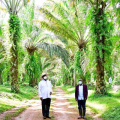 Environmentalists raise red flags over plan to expand oil palm fields in Kalangala
Environmentalists raise red flags over plan to expand oil palm fields in Kalangala
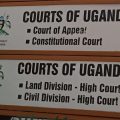 Uganda: Court of Appeal starts hearing an appeal case challenging the High Court’s decision of not canceling the ESIA certificate that allowed the cutting down of Bugoma Forest.
Uganda: Court of Appeal starts hearing an appeal case challenging the High Court’s decision of not canceling the ESIA certificate that allowed the cutting down of Bugoma Forest.
 UNCCD COP16: NGOs issue a stark warning and call for urgent actions to deal with the escalating threats of desertification, land degradation, and drought.
UNCCD COP16: NGOs issue a stark warning and call for urgent actions to deal with the escalating threats of desertification, land degradation, and drought.
MEDIA FOR CHANGE NETWORK
“Vacant Land” Narrative Fuels Dispossession and Ecological Crisis in Africa – New report.
Published
2 weeks agoon
November 13, 2025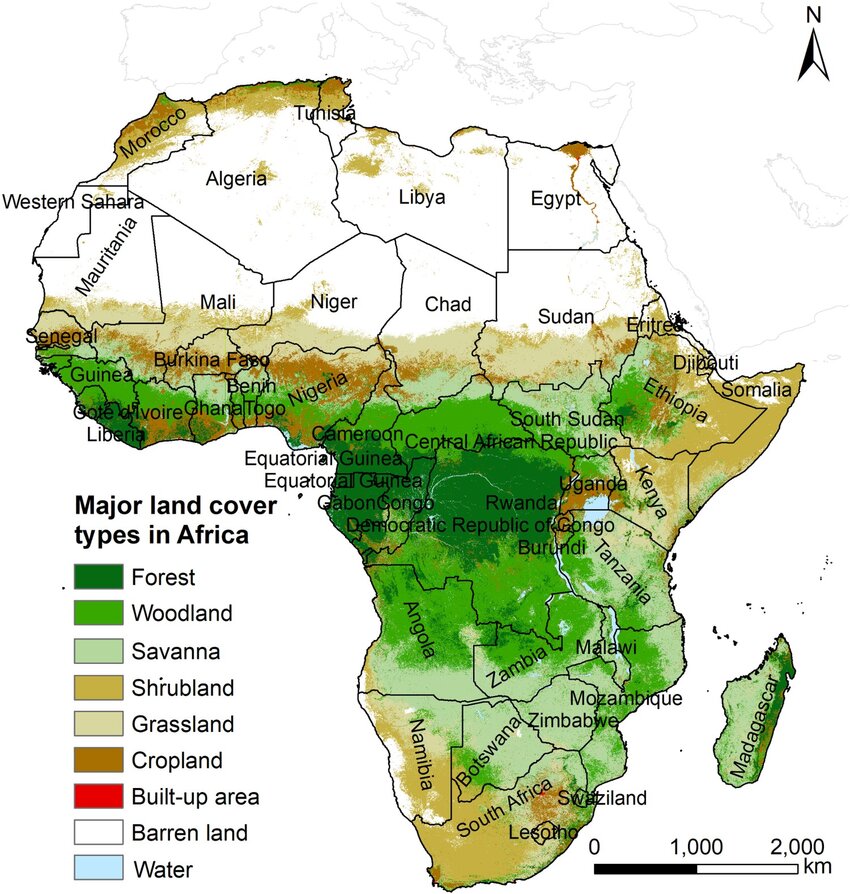
By Witness Radio team.
Over the years, the African continent has been damaged by the notion that it has vast and vacant land that is unused or underutilised, waiting to be transformed into industrial farms or profitable carbon markets. This myth, typical of the colonial era ideologies, has justified land grabs, mass displacements, and environmental destruction in the name of development and modernisation.
A new report by the Alliance for Food Sovereignty in Africa (AFSA) titled “Land Availability and Land-Use Changes in Africa (2025)” dismisses this narrative as misleading. Drawing on satellite data, field research, and interviews with farmers across Africa, including Zambia, Mozambique, South Africa, and Zimbabwe, the study reveals that far from being empty, Africa’s landscapes are multifunctional systems that sustain millions of lives.
“Much of the land labelled as “underutilised” is, in fact, used for grazing, shifting cultivation, gathering wild foods, spiritual practices, or is part of ecologically significant systems such as forests, wetlands, or savannahs. These uses are often invisible in formal land registries or economic metrics but are essential for local livelihoods and biodiversity. Moreover, the land often carries layered customary claims and is far from being available for simple expropriation,” says the report.
“Africa has seen three waves of dispossession, and we are in the midst of the third. The first was the alienation of land through conquest and annexation in the colonial period. In some parts of the continent, there have been reversals as part of national liberation struggles and the early independence era. But state developmentalism through the post-colonial period also brought about a second wave of state-driven land dispossession.” This historical context is crucial to understanding the current state of land rights and development in Africa. Said Ruth Hall, a professor at the Institute for Poverty, Land and Agrarian Studies (PLAS), at the University of the Western Cape in Cape Town, South Africa, during the official launch of the report.
The report further underestimates the assumption that smallholder farmers are unproductive and should be replaced with mechanised large-scale farming, leading to a loss of food sovereignty.
“The claim that small-scale farmers are incapable of feeding Africa is not supported by evidence. Africa has an estimated 33 million smallholder farmers, who manage 80% of the continent’s farmland and produce up to 80% of its food. Rather than being inefficient, small-scale agro-ecological farming offers numerous advantages: it is more labour-intensive, resilient to shocks, adaptable to local environments, and embedded in cultural and social life. Dismissing this sector in favour of large-scale, mechanised monocultures undermines food sovereignty, biodiversity, and rural employment.” Reads the Report.
The idea that industrial agriculture will lift millions out of poverty has not materialised. Instead, large-scale agribusiness projects have often concentrated land and wealth in the hands of elites and foreign investors. Job creation has been minimal, as modern farms rely heavily on machinery rather than human labour. Moreover, export-oriented agriculture prioritises global markets over local food security, leaving communities vulnerable to price fluctuations and shortages.
“The promise that agro-industrial expansion will create millions of decent jobs is historically and economically questionable. Agro-industrial models tend to displace labour through mechanisation and concentrate benefits in the hands of large companies. Most industrial agriculture jobs are seasonal, poorly paid, and insecure. In contrast, smallholder farming remains the primary source of employment across Africa, particularly for young people and women. The idea that technology-intensive farming will be a panacea for unemployment ignores the structural realities of African economies and the failures of previous industrialisation efforts.”
Additionally, the assumption that increasing yields and expanding markets will automatically improve food access overlooks the structural causes of food insecurity. People’s ability, particularly that of the poor and marginalised, to access nutritious food depends on land rights, income distribution, gender equity, and the functioning of political systems. In many countries, high agricultural productivity coexists with hunger and malnutrition because food systems are oriented towards export and profit rather than equitable distribution and local nourishment. It highlights the urgent need for equitable food distribution, making the audience more empathetic and aware of the issue.
Furthermore, technological fixes such as improved seeds, synthetic fertilizers, and irrigation are being promoted as solutions to Africa’s food insecurity, but evidence suggests otherwise. The Alliance for a Green Revolution in Africa (AGRA) spent over a decade pushing such technologies with little success; hunger actually increased in its target countries.
These high-input models overlook local ecological realities and structural inequalities, while increasing dependence on costly external inputs. As a result, smallholders often fall into debt and lose control over their own seeds and farming systems. It underscores the importance of understanding and respecting local ecological realities, making the audience feel more connected and responsible.
Africa is already experiencing an increased and accelerating squeeze on land due to competing demands including rapid population growth and urbanisation, Expansion of mining operations, especially for critical minerals like cobalt, lithium, and rare-earth elements, which are central to the global green transition, The proliferation of carbon-offset projects, often requiring vast tracts of land for afforestation or reforestation schemes that displace existing land users, Rising global demand for timber, which is increasing deforestation and land competition as well as Agricultural expansion for commodity crops, including large-scale plantations of palm oil, sugarcane, tobacco, and rubber.
“In East Africa, we see mass evictions, like the Maasai of Burunguru, forced from their ancestral territories in the name of conservation and tourism. In Central Africa, forests are cleared for mining of transitional minerals, destroying ecosystems and livelihoods. Women, a backbone of Africa’s food production, remain the most affected, and least consulted in decisions over land and resources and things that affect them.” Said Mariam Bassi Olsen from Friends of the Earth Nigeria, and a representative of the Alliance for Food Sovereignty in Africa.
The report urges a shift away from Africa’s high-tech, market-driven, land-intensive development model toward a just, sustainable, and locally grounded vision by promoting agroecology for food sovereignty, ecological renewal, and rural livelihoods, while reducing the need for land expansion through improved productivity, equitable food distribution, and reduced waste.
Additionally, a call is made for responsible urban planning, sustainable timber management, and reduced mineral demand through circular economies, as well as the legal recognition of customary land rights, especially for women and Indigenous peoples, and adherence to the principle of Free, Prior, and Informed Consent (FPIC) for all land investments.
Related posts:
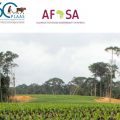
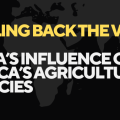 AGRA’s Silent Takeover: The Hidden Impact on Africa’s Agricultural Policies.
AGRA’s Silent Takeover: The Hidden Impact on Africa’s Agricultural Policies.
 63 million people food insecure in Horn of Africa: report
63 million people food insecure in Horn of Africa: report
 African Food Systems Summit 2024: Do not use it to promote failed agricultural models – African Faith Leaders.
African Food Systems Summit 2024: Do not use it to promote failed agricultural models – African Faith Leaders.
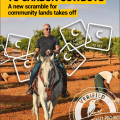 Carbon offset projects exacerbate land grabbing and undermine small farmers’ independence – GRAIN report
Carbon offset projects exacerbate land grabbing and undermine small farmers’ independence – GRAIN report

Activists storm TotalEnergies’ office ahead of G20 Summit, demand end to fossil fuel expansion in Africa

Environmentalists reject TFFF, warning it will deepen forest destruction.

“Vacant Land” Narrative Fuels Dispossession and Ecological Crisis in Africa – New report.

Uganda’s Army is on the spot for forcibly grabbing land for families in Pangero Chiefdom in Nebbi district.

Seed Boot Camp: A struggle to conserve local and indigenous seeds from extinction.

REC25 & EXPO Ends with a call on Uganda to balance conservation and livelihood

“Vacant Land” Narrative Fuels Dispossession and Ecological Crisis in Africa – New report.

Report reveals ongoing Human Rights Abuses and environmental destruction by the Chinese oil company CNOOC

Innovative Finance from Canada projects positive impact on local communities.
Over 5000 Indigenous Communities evicted in Kiryandongo District
Petition To Land Inquiry Commission Over Human Rights In Kiryandongo District
Invisible victims of Uganda Land Grabs
Resource Center
- REPARATORY AND CLIMATE JUSTICE MUST BE AT THE CORE OF COP30, SAY GLOBAL LEADERS AND MOVEMENTS
- LAND GRABS AT GUNPOINT REPORT IN KIRYANDONGO DISTRICT
- THOSE OIL LIARS! THEY DESTROYED MY BUSINESS!
- RESEARCH BRIEF -TOURISM POTENTIAL OF GREATER MASAKA -MARCH 2025
- The Mouila Declaration of the Informal Alliance against the Expansion of Industrial Monocultures
- FORCED LAND EVICTIONS IN UGANDA TRENDS RIGHTS OF DEFENDERS IMPACT AND CALL FOR ACTION
- 12 KEY DEMANDS FROM CSOS TO WORLD LEADERS AT THE OPENING OF COP16 IN SAUDI ARABIA
- PRESENDIANTIAL DIRECTIVE BANNING ALL LAND EVICTIONS IN UGANDA
Legal Framework
READ BY CATEGORY
Newsletter
Trending
-

 MEDIA FOR CHANGE NETWORK2 weeks ago
MEDIA FOR CHANGE NETWORK2 weeks ago“Vacant Land” Narrative Fuels Dispossession and Ecological Crisis in Africa – New report.
-

 MEDIA FOR CHANGE NETWORK3 days ago
MEDIA FOR CHANGE NETWORK3 days agoActivists storm TotalEnergies’ office ahead of G20 Summit, demand end to fossil fuel expansion in Africa
-

 MEDIA FOR CHANGE NETWORK2 weeks ago
MEDIA FOR CHANGE NETWORK2 weeks agoUganda’s Army is on the spot for forcibly grabbing land for families in Pangero Chiefdom in Nebbi district.
-

 MEDIA FOR CHANGE NETWORK2 weeks ago
MEDIA FOR CHANGE NETWORK2 weeks agoSeed Sovereignty: Most existing and emerging laws and policies on seeds are endangering seed saving and conservation on the African continent.
-

 MEDIA FOR CHANGE NETWORK4 days ago
MEDIA FOR CHANGE NETWORK4 days agoEnvironmentalists reject TFFF, warning it will deepen forest destruction.
-

 NGO WORK2 weeks ago
NGO WORK2 weeks agoDiscover How Foreign Interests and Resource Extraction Continue to Drive Congo’s Crisis
-
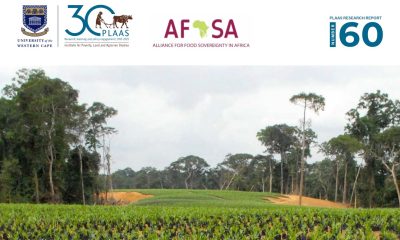
 NGO WORK2 weeks ago
NGO WORK2 weeks agoAfrica’s Land Is Not Empty: New Report Debunks the Myth of “Unused Land” and Calls for a Just Future for the Continent’s Farmland
-
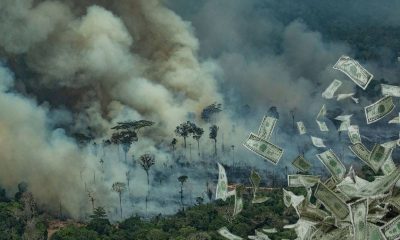
 NGO WORK2 weeks ago
NGO WORK2 weeks agoClimate wash: The World Bank’s Fresh Offensive on Land Rights
